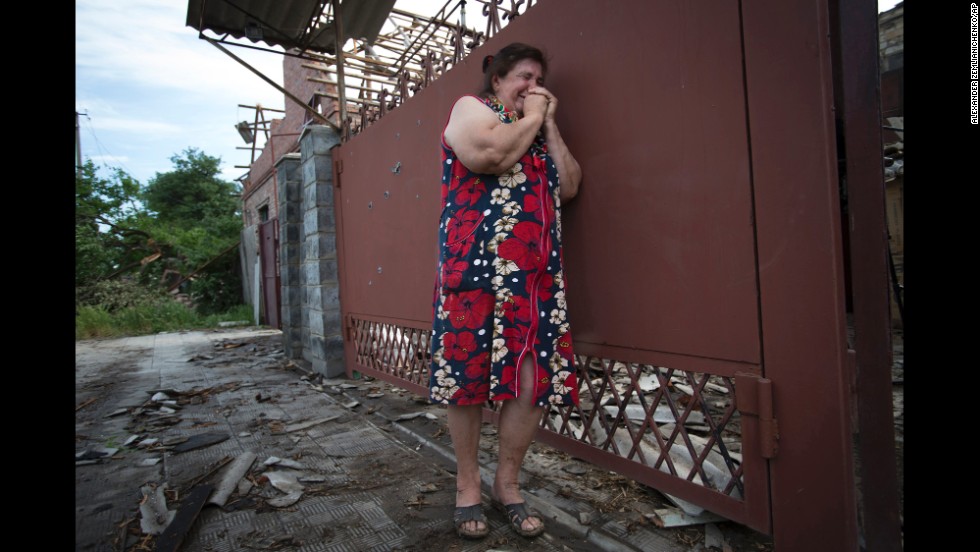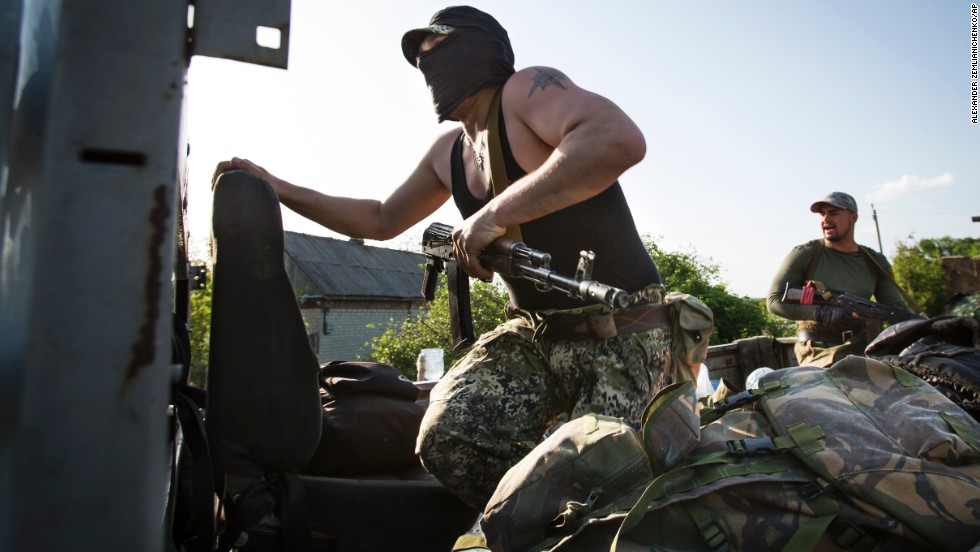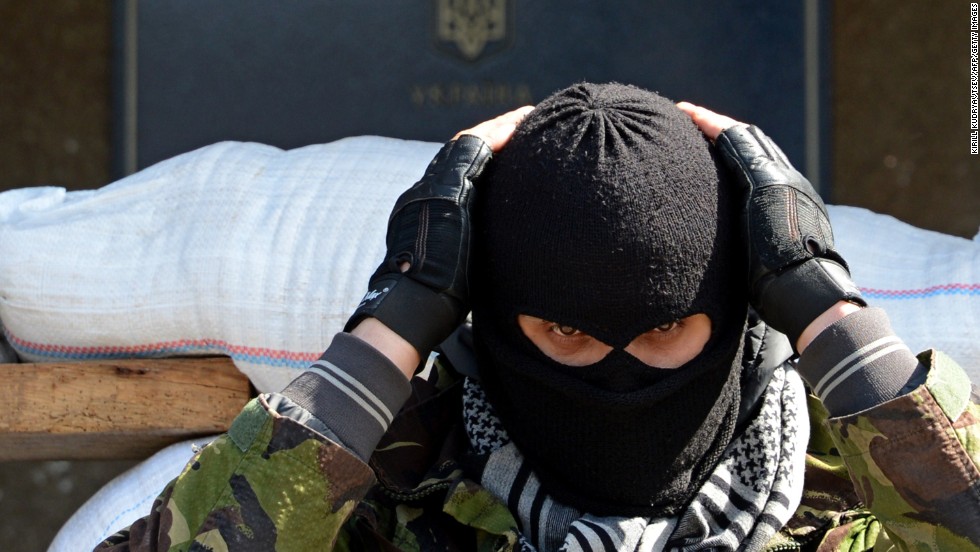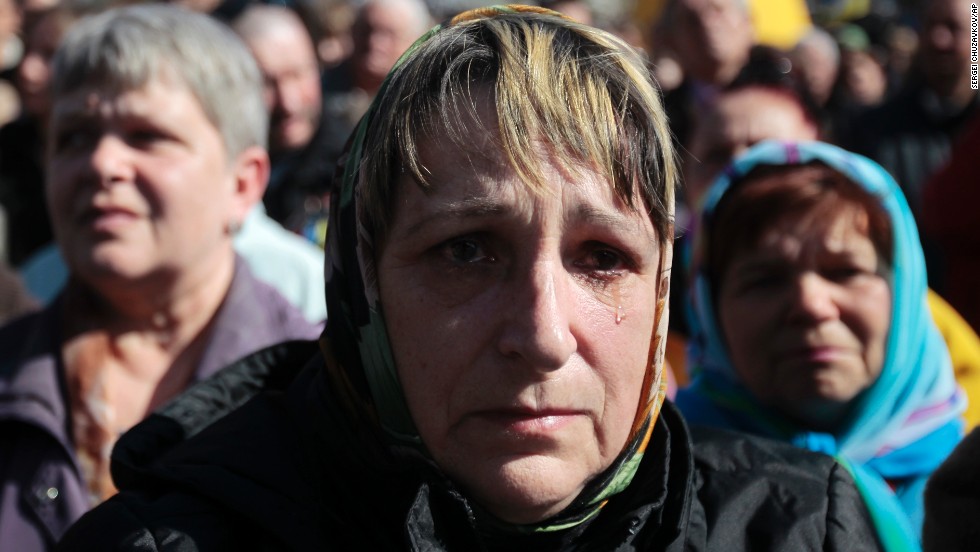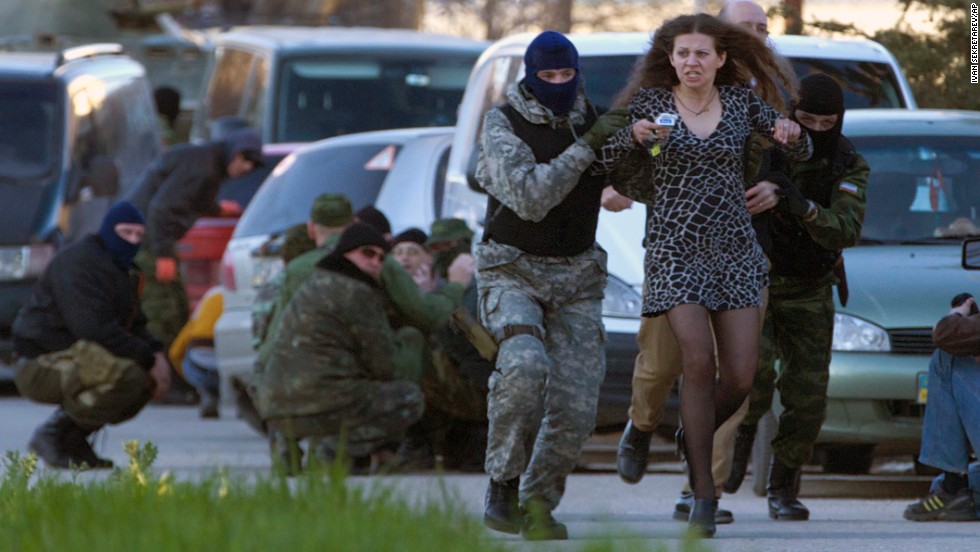Photos: Crisis in Ukraine
Crisis in Ukraine – A man looks at a bullet shell next to a destroyed car after a gunfight between pro-Russian militiamen and Ukrainian forces in Karlivka, Ukraine, on Friday, May 23. Much of Ukraine's unrest has been centered in the Donetsk and Luhansk regions, where separatists have claimed independence from the government in Kiev.
Photos: Crisis in Ukraine
Crisis in Ukraine – The body of a pro-Ukrainian militia fighter lies along a road in Karlivka on May 23.
Photos: Crisis in Ukraine
Crisis in Ukraine – A woman walks past a destroyed car after Ukrainian government forces fired mortar shells during clashes with pro-Russian forces in Slovyansk, Ukraine, on May 23.
Photos: Crisis in Ukraine
Crisis in Ukraine – A pro-Russian activist carries a ballot box away from a polling station in Donetsk, Ukraine, as he prepares to smash it on May 23.
Photos: Crisis in Ukraine
Crisis in Ukraine – Local citizens help support a woman at a rally protesting shelling by Ukrainian government forces in the village of Semyonovka, Ukraine, on Thursday, May 22.
Photos: Crisis in Ukraine
Crisis in Ukraine – Bodies covered with blankets lie in a field near the village of Blahodatne, Ukraine, on May 22, as a Ukrainian soldier smokes next to his armored infantry vehicle.
Photos: Crisis in Ukraine
Crisis in Ukraine – A Ukrainian soldier rests inside an armored personnel carrier at a checkpoint near Slovyansk on Wednesday, May 21.
Photos: Crisis in Ukraine
Crisis in Ukraine – Yekaterina Len cries outside her home after it was hit by mortar shells during fighting between pro-Russian separatists and Ukrainian soldiers in Slovyansk on Tuesday, May 20.
Photos: Crisis in Ukraine
Crisis in Ukraine – A Ukrainian soldier stands guard on the road from Izium, Ukraine, to Slovyansk on Monday, May 19.
Photos: Crisis in Ukraine
Crisis in Ukraine – A new recruit gets his hair cut at a training camp for the Donbass Battalion, a pro-Ukrainian militia, in the Dnipropetrovsk region of Ukraine on May 19.
Photos: Crisis in Ukraine
Crisis in Ukraine – Pro-Russian armed militants guard a checkpoint in Slovyansk on May 19, blocking a major highway to Kharkiv.
Photos: Crisis in Ukraine
Crisis in Ukraine – Pro-Russian militants detain three men on Sunday, May 18, in Kramatorsk, Ukraine. The men are suspected of spying for the Ukrainian government.
Photos: Crisis in Ukraine
Crisis in Ukraine – A bodyguard of insurgent leader Denis Pushilin stands in front of a statue of Russian revolutionary Vladimir Lenin during a pro-Russia rally in Donetsk on May 18.
Photos: Crisis in Ukraine
Crisis in Ukraine – Pro-Russian militants guard a checkpoint outside Slovyansk on Saturday, May 17.
Photos: Crisis in Ukraine
Crisis in Ukraine – Employees of the Ukrainian company Metinvest clear away debris in a government building in Mariupol, Ukraine, on Friday, May 16, after pro-Russian separatists relinquished their hold on it.
Photos: Crisis in Ukraine
Crisis in Ukraine – Pro-Russian activists argue in Mariupol about how to thwart the upcoming Ukrainian presidential elections.
Photos: Crisis in Ukraine
Crisis in Ukraine – Pro-Russian gunmen take up positions to fight Ukrainian national troops at a checkpoint outside Slovyansk on Thursday, May 15.
Photos: Crisis in Ukraine
Crisis in Ukraine – A mortar shell sticks out of the ground at a checkpoint near Slovyansk on May 15.
Photos: Crisis in Ukraine
Crisis in Ukraine – A man surveys the damage to his home after a mine exploded during an exchange of fire between pro-Russian militants and government troops outside Slovyansk on May 15.
Photos: Crisis in Ukraine
Crisis in Ukraine – A man examines ballots at a printing house in Kiev, Ukraine, on Wednesday, May 14. The ballots will be used in early presidential voting on May 25.
Photos: Crisis in Ukraine
Crisis in Ukraine – People collect mortar shells in front of a burnt-out Ukrainian military vehicle near Oktyabrskoe, Ukraine, on May 14.
Photos: Crisis in Ukraine
Crisis in Ukraine – Two men collect parts of a Ukrainian armored personnel carrier, destroyed May 14 in what the Ukrainian Defense Ministry called a terrorist attack near Kramatorsk.
Photos: Crisis in Ukraine
Crisis in Ukraine – A member of a "self-defense" squad smashes a slot machine with a sledgehammer Monday, May 12, at an illegal club in Slovyansk.
Photos: Crisis in Ukraine
Crisis in Ukraine – People celebrate with fireworks in Donetsk on May 12 as separatists declared independence for the Donetsk region.
Photos: Crisis in Ukraine
Crisis in Ukraine – Roman Lyagin, a member of a rebel election commission, shows referendum results to journalists at a May 12 news conference in Donetsk. Pro-Russian separatists staged the referendum asking residents in the Donetsk and Luhansk regions whether they should declare independence from Ukraine.
Photos: Crisis in Ukraine
Crisis in Ukraine – An armed pro-Russian separatist takes up a position near Slovyansk on May 12.
Photos: Crisis in Ukraine
Crisis in Ukraine – A man with a "self-defense" unit checks people's identification in Slovyansk on Sunday, May 11.
Photos: Crisis in Ukraine
Crisis in Ukraine – A person leaves a voting booth in Luhansk, Ukraine, on May 11. The Donetsk and Luhansk regions of eastern Ukraine voted on controversial referendums to declare independence from the government in Kiev. Acting Ukrainian President Oleksandr Turchynov called the vote "propagandist farce."
Photos: Crisis in Ukraine
Crisis in Ukraine – Two men react after Ukrainian national guardsmen open fire on a crowd outside a town hall in Krasnoarmiysk, Ukraine, on May 11.
Photos: Crisis in Ukraine
Crisis in Ukraine – A Ukrainian woman votes at a polling station in Donetsk on May 11.
Photos: Crisis in Ukraine
Crisis in Ukraine – Ukrainians line up to cast their votes at a polling station in Donetsk on May 11.
Photos: Crisis in Ukraine
Crisis in Ukraine – A voter casts her ballot in eastern Ukraine's independence referendum in Slovyansk on May 11.
Photos: Crisis in Ukraine
Crisis in Ukraine – An armed pro-Russian man sits below a flag of the self-proclaimed Donetsk People's Republic at the barricades on a road leading into Slovyansk on May 11.
Photos: Crisis in Ukraine
Crisis in Ukraine – Black smoke billows from burning tires used to prevent government troops' armored personnel carriers from passing through in Mariupol on Saturday, May 10.
Photos: Crisis in Ukraine
Crisis in Ukraine – The mother of Dmitriy Nikityuk, who died in a fire at a trade union building during riots in Odessa, Ukraine, cries next to his coffin during his funeral on Thursday, May 8.
Photos: Crisis in Ukraine
Crisis in Ukraine – A Ukrainian soldier keeps guard at a checkpoint near Slovyansk on May 8.
Photos: Crisis in Ukraine
Crisis in Ukraine – A pro-Russian activist stands with a Russian national flag outside the regional Interior Ministry building in Luhansk on Wednesday, May 7.
Photos: Crisis in Ukraine
Crisis in Ukraine – Ukrainian Prime Minister Arseniy Yatsenyuk, right, inspects an armored personnel carrier in Slovyansk on May 7.
Photos: Crisis in Ukraine
Crisis in Ukraine – An armed pro-Russian separatist takes a position by the railway lines near Slovyansk on Tuesday, May 6.
Photos: Crisis in Ukraine
Crisis in Ukraine – A relative mourns by the body of 17-year-old Vadim Papura during a service in Odessa on May 6. Papura died after jumping out of a burning trade union building during riots on May 2.
Photos: Crisis in Ukraine
Crisis in Ukraine – A pro-Russian gunman holds his weapon while guarding the local administration building in Slovyansk on May 6.
Photos: Crisis in Ukraine
Crisis in Ukraine – Pro-Russian supporters lead blindfolded men in front of the regional administration building in Donetsk on Monday, May 5.
Photos: Crisis in Ukraine
Crisis in Ukraine – Ukrainian policemen check documents at a checkpoint near the northeastern city of Izium on May 5.
Photos: Crisis in Ukraine
Crisis in Ukraine – Ukrainian soldiers stand at a checkpoint near Slovyansk on May 5.
Photos: Crisis in Ukraine
Crisis in Ukraine – Pro-Russian Cossacks sit outside the regional administration building in Donetsk on May 5.
Photos: Crisis in Ukraine
Crisis in Ukraine – Pro-Russian militants who were arrested during a Ukrainian unity rally are greeted on Sunday, May 4, after being freed by police in Odessa. The men released Sunday had been detained after bloody clashes in Odessa, which ended in a deadly blaze. Forty-six people were killed in the bloodshed.
Photos: Crisis in Ukraine
Crisis in Ukraine – A pro-Russian militant reacts after being freed on May 4 in Odessa.
Photos: Crisis in Ukraine
Crisis in Ukraine – Pro-Russian militants clash with police as they storm the police station in Odessa on May 4.
Photos: Crisis in Ukraine
Crisis in Ukraine – An Orthodox priest, in front of the administration building in Donetsk, blesses a pro-Russian activist May 4 as people gather to honor the memory of fallen comrades in Odessa.
Photos: Crisis in Ukraine
Crisis in Ukraine – Red carnations are left inside the burned trade union building in Odessa on May 4. Flowers, candles and photos of the dead piled up outside the charred building, a day after brutal clashes and the fire claimed 46 lives.
Photos: Crisis in Ukraine
Crisis in Ukraine – Pro-Russian protesters light candles in Donetsk on Saturday, May 3, to honor the memory of fallen comrades in Odessa.
Photos: Crisis in Ukraine
Crisis in Ukraine – A woman cries in front of the burned trade union building in Odessa on May 3.
Photos: Crisis in Ukraine
Crisis in Ukraine – A man walks past burning tires near Kramatorsk on May 3.
Photos: Crisis in Ukraine
Crisis in Ukraine – Pro-Russian activists beat a pro-Ukraine supporter trying to save the Ukrainian flag that was removed from a flagpole outside the burned trade union building in Odessa.
Photos: Crisis in Ukraine
Crisis in Ukraine – Pro-Russian protesters gather in Donetsk to honor the memory of comrades who died in Odessa.
Photos: Crisis in Ukraine
Crisis in Ukraine – A portrait of Bolshevik leader Vladimir Lenin is part of a barricade in the center of Slovyansk on May 3. The city has become the focus of an armed pro-Russian, anti-government insurgency that aspires to give the eastern regions of Ukraine full autonomy.
Photos: Crisis in Ukraine
Crisis in Ukraine – A pro-Russian activist sits in front of policemen guarding the burned trade union building in Odessa on May 3.
Photos: Crisis in Ukraine
Crisis in Ukraine – People lay flowers and candles at the burned trade union building in Odessa on May 3.
Photos: Crisis in Ukraine
Crisis in Ukraine – Ukrainian soldiers arrive to reinforce a checkpoint that troops seized Friday, May 2, in Andreevka, a village near Slovyansk. Two helicopters were downed Friday as Ukrainian security forces tried to dislodge pro-Russian separatists from Slovyansk, Ukraine's Defense Ministry said.
Photos: Crisis in Ukraine
Crisis in Ukraine – Police take cover under shields as pro-Russian activists storm the prosecutor's office in Donetsk on Thursday, May 1. Eastern Ukraine was a heartland of support for President Viktor Yanukovych, who was ousted in February.
Photos: Crisis in Ukraine
Crisis in Ukraine – A pro-Russian activist is wounded after storming the prosecutor's office in Donetsk and clashing with riot police on May 1.
Photos: Crisis in Ukraine
Crisis in Ukraine – Pro-Russian activists storm the prosecutor's office in Donetsk on May 1. Police fired tear gas and stun grenades in an effort to disperse the activists.
Photos: Crisis in Ukraine
Crisis in Ukraine – An injured Pro-Russian activist speaks with an armed protester during clashes with police in front of the regional administration building in Donetsk on May 1.
Photos: Crisis in Ukraine
Crisis in Ukraine – Pro-Russian activists storm an administration building in the center of Luhansk on Tuesday, April 29.
Photos: Crisis in Ukraine
Crisis in Ukraine – Pro-Russia militants, armed with baseball bats and iron bars, hold flares as they attack people marching for national unity in Donetsk on Monday, April 28.
Photos: Crisis in Ukraine
Crisis in Ukraine – Detained observers from the Organization for Security and Co-operation in Europe arrive to take part in a news conference Sunday, April 27, in Slovyansk. Vyacheslav Ponomarev, the self-declared mayor of Slovyansk, referred to the observers as "prisoners of war."
Photos: Crisis in Ukraine
Crisis in Ukraine – Ukrainian troops stand guard behind a barricade made of sandbags at a checkpoint about 30 kilometers (20 miles) from Slovyansk on April 27.
Photos: Crisis in Ukraine
Crisis in Ukraine – Relatives and friends of a man killed in a gunfight participate in his funeral ceremony in Slovyansk on Saturday, April 26.
Photos: Crisis in Ukraine
Crisis in Ukraine – U.S. troops arrive at an air force base near Siauliai Zuokniai, Lithuania, on April 26. The United States is conducting military exercises in Poland, Latvia, Estonia and Lithuania. The exercises are, in part, a response to the ongoing instability in Ukraine.
Photos: Crisis in Ukraine
Crisis in Ukraine – Ukrainian government troops in armored vehicles travel on a country road outside the town of Svyitohirsk in eastern Ukraine on April 26.
Photos: Crisis in Ukraine
Crisis in Ukraine – Pro-Russia armed militants inspect a truck near Slovyansk on Friday, April 25. Russian Foreign Minister Sergey Lavrov has accused the West of plotting to control Ukraine, and he said the pro-Russia insurgents in the southeast would lay down their arms only if the Ukrainian government clears out the Maidan protest camp in the capital, Kiev.
Photos: Crisis in Ukraine
Crisis in Ukraine – Pro-Russia militants keep records of their duty in Slovyansk on April 25.
Photos: Crisis in Ukraine
Crisis in Ukraine – Ukrainian troops take position near burning tires at a pro-Russian checkpoint in Slovyansk on Thursday, April 24.
Photos: Crisis in Ukraine
Crisis in Ukraine – Ukrainian special forces take position at an abandoned roadblock in Slovyansk on April 24.
Photos: Crisis in Ukraine
Crisis in Ukraine – A Ukrainian special forces member takes position in Slovyansk.
Photos: Crisis in Ukraine
Crisis in Ukraine – Cossacks carry a coffin into a church in Slovyansk on Tuesday, April 22, during a funeral for men killed in a gunfight at a checkpoint two days before.
Photos: Crisis in Ukraine
Crisis in Ukraine – U.S. Vice President Joe Biden, left, talks with Ukrainian Prime Minister Arseniy Yatsenyuk during a meeting in Kiev on April 22.
Photos: Crisis in Ukraine
Crisis in Ukraine – An armed pro-Russian man stands on a street in Slovyansk on Monday, April 21.
Photos: Crisis in Ukraine
Crisis in Ukraine – Demonstrators attend a pro-Russian rally outside the secret service building in Luhansk on April 21.
Photos: Crisis in Ukraine
Crisis in Ukraine – Cars are burned out after an attack at a roadblock in Slovyansk on Sunday, April 20.
Photos: Crisis in Ukraine
Crisis in Ukraine – A resident inspects burnt-out cars at a roadblock on April 20.
Photos: Crisis in Ukraine
Crisis in Ukraine – A pro-Russian militant is seen at the roadblock near Slovyansk on April 20.
Photos: Crisis in Ukraine
Crisis in Ukraine – Armed pro-Russian militants stand guard at a roadblock near Slovyansk on April 20.
Photos: Crisis in Ukraine
Crisis in Ukraine – A masked man stands guard outside a regional administration building seized by pro-Russian separatists in Slovyansk on Friday, April 18.
Photos: Crisis in Ukraine
Crisis in Ukraine – People walk around barricades April 18 set up at the regional administration building that was seized earlier in Donetsk.
Photos: Crisis in Ukraine
Crisis in Ukraine – Russian President Vladimir Putin speaks to the media after a nationally televised question-and-answer session in Moscow on Thursday, April 17. Putin denied that Russian forces are involved in the unrest in eastern Ukraine, though he did say for the first time that Russians were active in Crimea before the peninsula voted to join the country.
Photos: Crisis in Ukraine
Crisis in Ukraine – Ukrainian riot police officers stand guard during a pro-Ukrainian demonstration in Donetsk on April 17.
Photos: Crisis in Ukraine
Crisis in Ukraine – Masked pro-Russian protesters stand guard in front of the city hall in Mariupol on April 17.
Photos: Crisis in Ukraine
Crisis in Ukraine – U.S. Secretary of State John Kerry reaches out to shake hands with Russian Foreign Minister Sergey Lavrov at the start of a bilateral meeting to discuss the ongoing situation in Ukraine. The meeting took place April 17 in Geneva, Switzerland.
Photos: Crisis in Ukraine
Crisis in Ukraine – A masked gunman stands guard near tanks in Slovyansk on Wednesday, April 16.
Photos: Crisis in Ukraine
Crisis in Ukraine – A Ukrainian helicopter flies over a column of Ukrainian Army combat vehicles on the way to Kramatorsk on April 16.
Photos: Crisis in Ukraine
Crisis in Ukraine – A masked pro-Russian gunman guards combat vehicles parked in downtown Slovyansk on April 16.
Photos: Crisis in Ukraine
Crisis in Ukraine – A man talks with Ukrainian soldiers as they are blocked by people on their way to Kramatorsk.
Photos: Crisis in Ukraine
Crisis in Ukraine – Ukrainian soldiers sit atop combat vehicles on their way to Kramatorsk.
Photos: Crisis in Ukraine
Crisis in Ukraine – Ukrainian Gen. Vasily Krutov is surrounded by protesters after addressing the crowd outside an airfield in Kramatorsk on Tuesday, April 15.
Photos: Crisis in Ukraine
Crisis in Ukraine – Pro-Russian activists guard a barricade April 15 outside the regional police building that they seized in Slovyansk.
Photos: Crisis in Ukraine
Crisis in Ukraine – Ukrainian troops receive munitions at a field on the outskirts of Izium on April 15.
Photos: Crisis in Ukraine
Crisis in Ukraine – Armed pro-Russian activists stand guard on top of a Ukrainian regional administration building in Slovyansk on Monday, April 14.
Photos: Crisis in Ukraine
Crisis in Ukraine – A pro-Russian activist carries a shield during the mass storming of a police station in Horlivka, Ukraine, on April 14.
Photos: Crisis in Ukraine
Crisis in Ukraine – Russian supporters attend a rally in front of the security service building occupied by pro-Russian activists in Luhansk on April 14.
Photos: Crisis in Ukraine
Crisis in Ukraine – A man places a Russian flag over a police station after storming the building in Horlivka on April 14.
Photos: Crisis in Ukraine
Crisis in Ukraine – Men besiege the police station in Horlivka.
Photos: Crisis in Ukraine
Crisis in Ukraine – The Horlivka police station burns on April 14.
Photos: Crisis in Ukraine
Crisis in Ukraine – A Ukrainian police officer receives medical care after being attacked at the police station in Horlivka on April 14.
Photos: Crisis in Ukraine
Crisis in Ukraine – Pro-Russian supporters beat a pro-Ukrainian activist during a rally in Kharkiv on Sunday, April 13.
Photos: Crisis in Ukraine
Crisis in Ukraine – Pro-Russian activists escort a man outside the secret service building in Luhansk on April 13.
Photos: Crisis in Ukraine
Crisis in Ukraine – Pro-Russian protesters guard a barricade in Slovyansk on April 13 outside a regional police building seized by armed separatists the day before.
Photos: Crisis in Ukraine
Crisis in Ukraine – Armed pro-Russian activists carrying riot shields occupy a police station in Slovyansk on April 12.
Photos: Crisis in Ukraine
Crisis in Ukraine – A group of pro-Russian activists warm themselves by a fire Friday, April 11, in front of a Ukrainian Security Service office in Luhansk.
Photos: Crisis in Ukraine
Crisis in Ukraine – Ukrainian Prime Minister Arseniy Yatsenyuk speaks April 11 during his meeting with regional leaders in Donetsk. Yatsenyuk flew into Donetsk, where pro-Russian separatists occupied the regional administration building and called for a referendum.
Photos: Crisis in Ukraine
Crisis in Ukraine – Pro-Russian young men look over the fence of a military recruitment office in Donetsk on Thursday, April 10.
Photos: Crisis in Ukraine
Crisis in Ukraine – Armed pro-Russian protesters occupy the Security Service building in Luhansk on April 10.
Photos: Crisis in Ukraine
Crisis in Ukraine – Members of the self-proclaimed government the "Donetsk Republic" vote April 10 during a meeting at the seized regional administration building in Donetsk.
Photos: Crisis in Ukraine
Crisis in Ukraine – Ukrainian lawmakers from different parties scuffle during a Parliament session in Kiev on Tuesday, April 8.
Photos: Crisis in Ukraine
Crisis in Ukraine – Workers clean up on April 8 after pro-Russian separatists and police clashed overnight in Kharkiv.
Photos: Crisis in Ukraine
Crisis in Ukraine – Pro-Russian protesters burn tires near a regional administration building in Kharkiv after police cleared the building on Monday, April 7.
Photos: Crisis in Ukraine
Crisis in Ukraine – A masked man stands on top of a barricade at the regional administration building in Donetsk on April 7.
Photos: Crisis in Ukraine
Crisis in Ukraine – Protesters wave a Russian flag as they storm the regional administration building in Donetsk on Sunday, April 6. Protesters seized state buildings in several east Ukrainian cities, prompting accusations from Kiev that Moscow is trying to "dismember" the country.
Photos: Crisis in Ukraine
Crisis in Ukraine – Pro-Russian protesters clash with police as they try to occupy a regional administration building in Donetsk on April 6.
Photos: Crisis in Ukraine
Crisis in Ukraine – Pro-Russian activists hold a rally in front of a Ukrainian Security Service office in Luhansk on April 6.
Photos: Crisis in Ukraine
Crisis in Ukraine – A young demonstrator with his mouth covered by a Russian flag attends a pro-Russia rally outside the regional government administration building in Donetsk on Saturday, April 5.
Photos: Crisis in Ukraine
Crisis in Ukraine – A Ukrainian soldier guards a road not far from Prokhody, a village near the Russian border, on April 5. Ukrainian and Western officials have voiced alarm about Russia's reported military buildup on Ukraine's eastern border.
Photos: Crisis in Ukraine
Crisis in Ukraine – Ukrainian cadets at the Higher Naval School embrace a friend who has decided to stay in the school during a departure ceremony in Sevastopol, Crimea, on Friday, April 4. Some 120 cadets who refused to take Russian citizenship left the school to return to Ukraine.
Photos: Crisis in Ukraine
Crisis in Ukraine – Soviet military veterans take part in a flower-laying ceremony at the Soviet-era World War II memorial in Sevastopol on Thursday, April 3.
Photos: Crisis in Ukraine
Crisis in Ukraine – Ukrainian soldiers conduct a training session on the Desna military shooting range northeast of Kiev on Wednesday, April 2.
Photos: Crisis in Ukraine
Crisis in Ukraine – Russian soldiers prepare for diving training in front of a Tarantul-III class missile boat Tuesday, April 1, in Sevastopol.
Photos: Crisis in Ukraine
Crisis in Ukraine – People pass by barricades near the Dnipro Hotel in Kiev on April 1.
Photos: Crisis in Ukraine
Crisis in Ukraine – People walk past a train loaded with Russian tanks Monday, March 31, in the Gvardeyskoe railway station near Simferopol, Crimea.
Photos: Crisis in Ukraine
Crisis in Ukraine – A Russian solder sits in a tank at the Ostryakovo railway station, not far from Simferopol on March 31.
Photos: Crisis in Ukraine
Crisis in Ukraine – Russian Prime Minister Dmitry Medvedev speaks about the economic development of Crimea during a meeting March 31 in Simferopol.
Photos: Crisis in Ukraine
Crisis in Ukraine – Members of the Ukrainian National Guard take part in military exercises on a shooting range near Kiev on March 31.
Photos: Crisis in Ukraine
Crisis in Ukraine – A woman cries Sunday, March 30, during a gathering to honor those who were killed during protests in Kiev's Independence Square.
Photos: Crisis in Ukraine
Crisis in Ukraine – A woman and child walk past a line of police officers during a rally in Kharkiv on March 30.
Photos: Crisis in Ukraine
Crisis in Ukraine – Ukrainian soldiers take part in a training exercise at a military base in Donetsk on Saturday, March 29.
Photos: Crisis in Ukraine
Crisis in Ukraine – Demonstrators protest Friday, March 28, in Kiev, displaying police vehicles they seized during earlier clashes with authorities.
Photos: Crisis in Ukraine
Photos: Crisis in Ukraine
Crisis in Ukraine – Ukrainian tanks are transported from their base in Perevalne, Crimea, on Wednesday, March 26. After Russian troops seized most of Ukraine's bases in Crimea, interim Ukrainian President Oleksandr Turchynov ordered the withdrawal of armed forces from the Black Sea peninsula, citing Russian threats to the lives of military staff and their families.
Photos: Crisis in Ukraine
Crisis in Ukraine – Ukrainian marines wave as they leave a base in Feodosia, Crimea, on Tuesday, March 25.
Photos: Crisis in Ukraine
Crisis in Ukraine – Russian sailors stand on the deck of the corvette ship Suzdalets in the bay of Sevastopol on March 25.
Photos: Crisis in Ukraine
Crisis in Ukraine – Pro-Russian militia members remove a resident as Russian troops assault the Belbek air base, outside Sevastopol, on Saturday, March 22. After its annexation of Crimea, Russian forces have consolidated their control of the region.
Photos: Crisis in Ukraine
Crisis in Ukraine – Soldiers in unmarked uniforms sit atop an armored personnel carrier at the gate of the Belbek air base on March 22.
Photos: Crisis in Ukraine
Crisis in Ukraine – A Russian sailor holds the Russian Navy's St. Andrew's flag while standing on the bow of the surrendered Ukrainian submarine Zaporozhye on March 22 in Sevastopol.
Photos: Crisis in Ukraine
Crisis in Ukraine – Russian President Vladimir Putin signs the final decree completing the annexation of Crimea on Friday, March 21, as Upper House Speaker Valentina Matviyenko, left, and State Duma Speaker Sergei Naryshkin watch.
Photos: Crisis in Ukraine
Crisis in Ukraine – A Ukrainian serviceman leaves a Ukrainian military unit that Russian soldiers took control of in Perevalne on March 21.
Photos: Crisis in Ukraine
Crisis in Ukraine – Ukrainian border guards run during training at a military camp in Alekseyevka, Ukraine, on March 21.
Photos: Crisis in Ukraine
Crisis in Ukraine – Russian soldiers patrol the area surrounding a Ukrainian military unit in Perevalne on Thursday, March 20.
Photos: Crisis in Ukraine
Crisis in Ukraine – Pro-Russian protesters remove the gate to the Ukrainian navy headquarters as Russian troops stand guard in Sevastopol on Wednesday, March 19.
Photos: Crisis in Ukraine
Crisis in Ukraine – Pro-Russian forces walk inside the Ukrainian navy headquarters in Sevastopol on March 19.
Photos: Crisis in Ukraine
Crisis in Ukraine – A member of pro-Russian forces takes down a Ukrainian flag at the Ukrainian navy headquarters in Sevastopol on March 19.
Photos: Crisis in Ukraine
Crisis in Ukraine – Alexander Vitko, chief of the Russian Black Sea Fleet, leaves the Ukrainian navy headquarters in Sevastopol after pro-Russian forces took it over on March 19.
Photos: Crisis in Ukraine
Crisis in Ukraine – A Russian flag waves as workers install a new sign on a parliament building in Simferopol, Crimea's capital, on March 19.
Photos: Crisis in Ukraine
Crisis in Ukraine – Russian military personnel surround a Ukrainian military base in Perevalne on March 19.
Photos: Crisis in Ukraine
Crisis in Ukraine – Nameplates on the front of the Crimean parliament building get removed Tuesday, March 18, in Simferopol.
Photos: Crisis in Ukraine
Crisis in Ukraine – From left, Crimean Prime Minister Sergey Aksyonov; Vladimir Konstantinov, speaker of the Crimean parliament; Russian President Vladimir Putin; and Alexei Chaly, the new de facto mayor of Sevastopol, join hands in Moscow on March 18 after signing a treaty to make Crimea part of Russia.
Photos: Crisis in Ukraine
Crisis in Ukraine – Demonstrators hold a Crimean flag at Lenin Square in Simferopol on March 18.
Photos: Crisis in Ukraine
Crisis in Ukraine – Ukrainian soldiers stand guard at a checkpoint near Strilkove, Ukraine, close to Crimea on Monday, March 17.
Photos: Crisis in Ukraine
Crisis in Ukraine – Former boxer and Ukrainian politician Vitali Klitschko addresses reporters in Kiev on March 17.
Photos: Crisis in Ukraine
Crisis in Ukraine – Ukrainian troops stand guard in front of the Ukrainian Parliament building in Kiev on March 17.
Photos: Crisis in Ukraine
Crisis in Ukraine – A Ukrainian man applies for the National Guard at a mobile recruitment center in Kiev on March 17.
Photos: Crisis in Ukraine
Crisis in Ukraine – Civilians walk past riot police in Simferopol on March 17.
Photos: Crisis in Ukraine
Crisis in Ukraine – A Ukrainian soldier stands on top of an armored vehicle at a military camp near the village of Michurino, Ukraine, on March 17.
Photos: Crisis in Ukraine
Crisis in Ukraine – Policemen stand guard outside the regional state administration building in Donetsk during a rally by pro-Russia activists March 17.
Photos: Crisis in Ukraine
Crisis in Ukraine – Armed soldiers stand guard outside a Ukrainian military base in Perevalne on March 17.
Photos: Crisis in Ukraine
Crisis in Ukraine – A man holds a Crimean flag as he stands in front of the Crimean parliament building in Simferopol on March 17.
Photos: Crisis in Ukraine
Crisis in Ukraine – Crimeans holding Russian flags celebrate in front of the parliament building in Simferopol on Sunday, March 16.
Photos: Crisis in Ukraine
Crisis in Ukraine – A Ukrainian police officer tries to shield himself from a road block thrown by pro-Russia supporters in Kharkiv on March 16.
Photos: Crisis in Ukraine
Crisis in Ukraine – Pro-Russia demonstrators storm the prosecutor general's office during a rally in Donetsk on March 16.
Photos: Crisis in Ukraine









